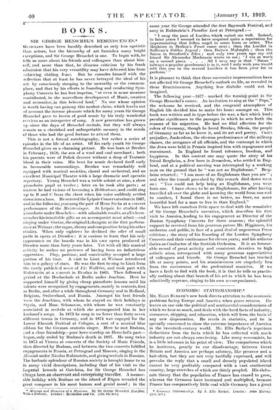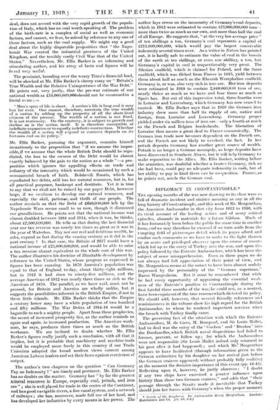ECONOMIC STATESMANSHIP.*
Etus 13.inKER's new book directs attention to the economic problems facing Europe and America when peace returns. Ho leaves on one side the political and sentimental considerations of which we hear so much, and deals with the hard facts of industry, commerce, shipping, and education, which will form the basis of any new dispensation. He revels in statistics, and ho is specialty concerned to show the extreme importance of America in the twentieth-century world. Mr. Ellis Barker's ingenious deductions from the facts which he has collected with much industry are not always convincing. Like many economists, he is a little inhumrm in his point of view. The comparisons which he institutes, greatly to our disadvantage, beta-cal Great Britain and America are perhaps salutary, like penance and a hair-shirt, but they are not very tactfully expressed, and will provoke the reply that a small and densely populated island cannot be very profitably compared with a vast continental country, large stretches of which are thinly peopled. His elabo- rate theory that the population of France has ceased to grow, whereas the Germans have increased and multiplied, because France has comparatively little coal while Gerinany has a great • Eeouuaoi Sdlelemdcalip. Dy J. Mb Bather. London Jstat Murray. Lthe. sell
deal, does not accord with the very rapid growth of the popula- tion of Italy, which has uo coal worth speaking of. The problem of the birth-rate is a complex of social as well as economic factors, and cannot, we fear, be solved by reference to any one of those factors, such as the coal supply. We might say a good deal about the highly disputable proposition that " the Napo- leonic War created the industrial greatness of the United Kingdom, and the terribly costly Civil War that of the United States." Nevertheless, Mr. Ellis Barker is an informing and stimulating author, and his array of facts and figures will be fornd very useful.
The pessimist, brooding over the weary Titan's financial load, will be shocked at Mr. Ellis Barker's cheery essay on " Britain's True Wealth and the Relative Unimportance of the War Debt." He points out, very justly, that the pre-war estimate of our national wealth as £19,000,009,000 should not be construed in a literal sense
"Mama apan of life is short. A nation's life is long and it may last for ever. One cannot, therefore, ascertain the true nealth of a nation by adding up the property of all the short-lived citizens of the present. The wealth of a nation is not fixed. It is not stationary. On the contrary, it is subject to growth and decline as is the nation itself. It is therefore susceptible of indefinite expansion or to equally indefinite contraction. Whether the wealth of Is nation will expand or contract depends on its fortunes and on its policy."
Mr. Ellis Barker, pursuing the argument, commits himself incautiously to the proposition that " if we assume the impels- sible, if we assume that the whole British Debt should he repu- diated, the loss to the owners of the Debt would be almost exactly balanced by the gain to the nation as a whole "—a pro- position which ignores the appalling effects on trade and industry of the insecurity which would be occasioned by such a monumental breach of faith. Bolshevik Russia, which has epudiated her debts, still has her natural resources, but is, for all practical purposes, bankrupt and destitute. Yet it is true to say that we shell not be ruined by our paper Debt, however large, if we continue to develop our natural resources, and especially the skill, patienee, and thrift of our people. The author reminds us that the Debt of ffif40,000,000 left by the Napoleonic Wars seems small to us now, though it distressed our grandfathers. Ile points out that the national income was almost doubled between 1884 and 1914, when it was, he thinks, about £2,500,090,000. He tells us that during the last financial year our tax revenue was nearly ten times as great as it was in the year of Waterloo. May not our real and fictitious wealth, he asks, expand as fast during the coining century as it did in the past century In that case, the Britain of 2017 would have a national income of £25,000,000,000, and would be able to raise a tax revenue almost equivalent to the whole east of this war. The author illustrates his doctrine of illimitable development by reference to the United State!, whose progress as expressed in figures has been amazing. In 1870 America's population was equal to that of England to-day, about thirty-eight millions, but in 1912 it had risen to ninety-five millions, and the average American of 1912 was nearly three times as rich as the American of 1870. The parallel, as we have said, must not be pressed, for Britain and. America are wholly unlike, but- it suggests the poseibilities inherent in the British Empire, if not in there little islands. Mr. Ellis Barker thinks that the Empire a century hence may have a white population of two hundred and fifty millions, The War Debts of 1914-18 would be a bagatelle to such a mighty people. Apart from these prophecies, the secret of increased prosperity lies, as the author reminds us again and again, in increased production. The American work- man, he says, produces three times as much as the British workman. We are inclined to doubt whether Mr. Ellis Barker's figures really justify such a conclusion, with all that it implies, but it is probable that machinery and machine-tools would be employed more freely in this country if our Trade Unionists adopted the broad modern views current among American Labour leaders and set their faces against restriction of output.
The author's two chapters on the question " Can Germany Pay an Indemnity ?" arc timely and pertinent. Mx. Ellis Barker has no doubts on the matter. Germany has " by far the greatest mineral resources in Europe, especially coal, potash, and iron ore " ; she is well placed for trade in the centre of the Continent, and has good navigable rivers, a fine canal system, and a network of railways ; she has, moreover, made full use of her land, and has developed her industries by every means in her power. The author lays stress on the immensity of Germany's coal deposits, which in 1913 were estiMated to contain 423,000,000,000 tons— more than twice as much as our own, and more than half the coal of all Europe. He suggests that, "at the very low average price" of ten shillings a ton, Germany's coal represents a capital of £211,000,000,000, which would pay the largest conceivable indemnity several times over. An a writer in if store has pointed out, it is hardly safe to estimate the value of coal in the bowels of the earth at ten shillings, or even one shilling, a ton, but Germany's capital in coal is unquestionably very great. The Silesian coalfield, which is claimed for Poland, and the Sarre coalfield, which was filched from France in 1815, yield between them about half as much as the Rhenish Westphalian coalfield. Germany is, or was, also very rich in iron ore. Her iron deposits were estimated in 1910 to contain 2,840,003,030 tons of ore, nearly thrice as much as we have and four times as much as Spain has. But out of this impressive total, three-fourths were in Lorraine and Luxemburg, which Germany has now cease-1 to control. Mr. Ellis Barker says that in 1910 the German iron industry drew more than half its supply of ore, native and foreign, front Lorraine and Luxemburg. Gennany proper yielded, under six million ton* of iron ore --only a fourth as much as the French and Belgian borderland:J. The liberation of Lorraine thus means a great deal to France economically. The German iron trade now becomes dependent on the French ore, and the French are not likely to overlook the fact. In her potash deposits Germany has another great source of wealth. Potash is no longer a German monopoly, as large deposits have been discovered in Southern Alsaec, but it will kelp Germany to make reparation to the Allies. Mr, Ellis Barker, writing before the armistice, was doubtful whether a beaten Germany, rich as she had been, could pay an adequate indemnity in cash, but of her ability to pay in kind there can be no question. France, as he points out, needs the German coal.



































 Previous page
Previous page